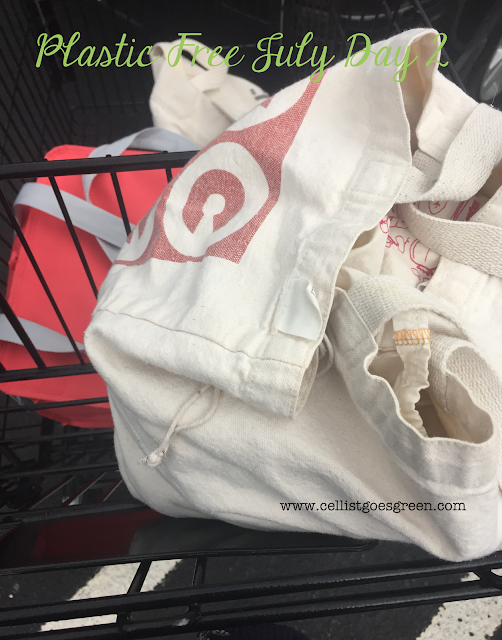
I do most of my shopping at our local-ish Whole Foods (it's about 25 minutes away), because they have the best selection locally of humanely-raised meat, milk in returnable glass bottles and dry bulk goods.
How I do my shopping:
- I bring my own canvas grocery bags
- I use small cloth draw-string bags for bulk dry goods (dried beans, oats, lentils, etc.)
- I bring a glass Pyrex container to the butcher, deli and cheese counter
- I buy milk in returnable glass bottles, and bring them back to the store when they are empty
How to make bulk shopping easy for you, and the people who work at the store
- Know the tare weight of your containers (For example, my cloth bulk bags weight .06 lbs, so when I go to the cashier, I make sure to tell them that).
- Keep a list of PLU numbers of dry bulk items on your phone, so you can tell the cashier when you check out. They will thank you.
- When you go to the meat and cheese counter to fill your container, be confident. If you sound unsure, the person behind the counter will be unsure, too. If you feel funny asking at first, try this: "Hi! I'd like ____ pounds of ________ in my container please! I'm participating in Plastic Free July, which is a challenge to use less disposable plastic. Thank you so much!"
(There is also a small health foods store near the Whole Foods which carries bulk spices and tea which we also go too. In the summer, I try to buy the bulk of our produce from our farmers market, but they don't have much in the way of organic or low-pesticide fruit, so it's a balancing act. Everybody's local situation is different, in terms of what is available. Do the best you can! :)
Now, what if you don't have a store that carries bulk near you? The Whole Foods we go to now is new, and we used to have to travel 40 minutes away--we just bought more at a time, and made fewer trips. But I fully recognize that is not an option for everyone.
Here are some suggestions you can put in place even if your local store doesn't have any bulk:
- Bring your own bags (Canvas bags made out of a natural material are a better choice than the plastic ones sold at the check-out lanes. If you don't have any, I like the ones Eco Bags makes.)
- Don't put your fruits and veggies in the plastic bags the store provides. I promise they will be fine in your cart without a bag.
- Try to make whole foods (vegetables and fruits) the center of your meals. They will obviously have less packaging than the processed food in the middle of the store.
- You can still ask the deli to put food in your container at a conventional store.
- When buying grains and beans that you use regularly, buy the biggest bag or container you think you can reasonably use before it goes bad to reduce packaging. When you go home, empty into a glass jar or container, and it will keep longer.
-------------------------------------
If you aren't familiar with Plastic Free July, take a look at this post. Basically, it's a month-long challenge to reduce the amount of disposable plastic you use. It's a great starting point if you just want to give cutting out disposable plastic a try.
My first Plastic Free July was in 2013(!), and this month I'd like to highlight some of the things I do to reduce my plastic use, and some struggles. Many things are part of my routine at this point (buying in bulk, refusing plastic silverware, etc.), but I am not perfect, and I always find this challenge to be a good time to refocus and look at what trash I am actually producing.

No comments:
Post a Comment